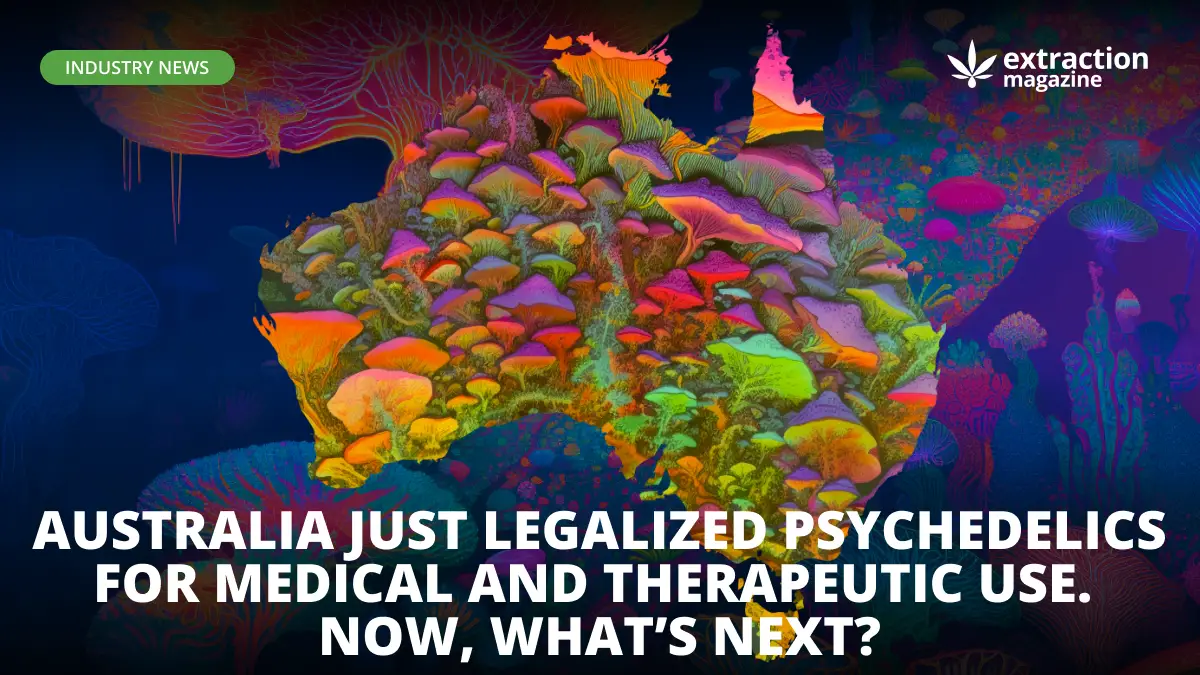Australia made history on July 1 as it became one of the pioneering nations to permit the use of MDMA (ecstasy) and magic mushrooms (psilocybin) for medical treatments, marking a radical shift in addressing certain mental health conditions.
In an effort to combat post-traumatic stress disorder (PTSD) and some forms of depression, authorized psychiatrists in the country can now prescribe a wider range of substances.
Australia took a significant step forward by reclassifying these drugs entirely following positive results from trials, leading the Therapeutic Goods Administration to deem them “relatively safe” when used in a controlled medical environment back in February’s press-release.
Advocates of this groundbreaking decision are optimistic that MDMA and psilocybin can provide much-needed breakthroughs for individuals battling mental health issues when traditional treatments have proven ineffective. However, authorities in the field claim that it’s not that simple.
Dr. Mike Musker, a mental health researcher at the University of South Australia, emphasized the meticulous monitoring of psychedelic substance use, stating that it would not be a mere “take and go” scenario:
@media(min-width:1066px){#div-gpt-ad-extractionmagazine_com-medrectangle-4-0-asloaded{max-width:300px!important;max-height:250px!important;}}@media(min-width:0px)and(max-width:1065px){#div-gpt-ad-extractionmagazine_com-medrectangle-4-0-asloaded{max-width:300px!important;max-height:250px!important;}}
“I have read about stories where people have had what you call bad trips, or actually they’ve re-experienced their trauma, and so we’ve got to take great caution”.
— Mike Musker, University of South Australia, source: AFP News Agency
USA Next?
The recent approval of psychedelic drugs in Australia may have a positive impact on the regulatory processes in the United States.
Canada and the United States have previously authorized the medical use of either MDMA or psilocybin, albeit exclusively within clinical trials or with special permits.
At this point, without any official comments from the FDA, we can say that the result will be largely dependent on the upcoming and previously released trials, involving psychoactive substances.
As one of the milestones for the MDMA part, the U.S. nonprofit Multidisciplinary Association for Psychedelic Studies has recently completed a second phase-three trial on ecastasy as a treatment for PTSD.
The findings of the trial, although yet to be published in a peer-reviewed journal, are expected to reinforce the positive outcomes observed in the initial study, which was published in Nature Medicine in 2021. The results were positive:
“MDMA-assisted therapy is highly efficacious in individuals with severe PTSD, and treatment is safe and well-tolerated, even in those with comorbidities.”
— MDMA-assisted therapy for severe PTSD: a randomized, double-blind, placebo-controlled phase 3 study, 1025–1033 (2021)
Rick Doblin, the founder and executive director of MAPS, expressed confidence in the forthcoming FDA approval process based on their accumulated data:
“It’s going to help regulators in the U.S. and elsewhere feel more comfortable. Regulators don’t like to be the first or the only ones.”
— Rick Doblin, the founder of Multidisciplinary Association for Psychedelic Studies, source: TIME Magazine
As for psilocybin, the process is largely the same: studies first, and when all the paperwork is done, opens the small window for possibilities.
One of the most important pieces of evidence to back psilocybin’s presumed efficiency in clinical setting as a beneficial mental health treatment tool, was published in November, 2022.
The study, “Single-Dose Psilocybin for a Treatment-Resistant Episode of Major Depression” ended with an overall positive conclusion: “psilocybin at a single dose of 25 mg, but not 10 mg, reduced depression scores significantly more than a 1-mg dose over a period of 3 weeks”.
However, the researchers also mention that a significant part of participants were subject to side effects.
@media(min-width:0px){#div-gpt-ad-extractionmagazine_com-large-leaderboard-2-0-asloaded{max-width:300px!important;max-height:250px!important;}}
In the middle of 2023, much-needed “larger and longer trials, including comparison with existing treatments”, are yet to be published.
Anything But Cheap
One practical aspect of the decision the experts are confident about is that the official therapy involving psychedelic substances in Australia is going to be costly for the majority of patients.
The major problem with the price of the therapy is the need to factor in multiple normative expenses that were never quite affordable:
- Interdisciplinary team of medical professionals;
- The session itself;
- Hiring a private clinic;
- The need to obtain psychoactive substances themselves from an approved source.
The cost of drugs alone is, according to The Sydney Morning Herald, may be over $1,000 per the amount necessary for a session. All of the aspects combined may spiral the final price tag for the patient up to 30,000 AUD (roughly $20,000), according to BBC source’s calculations.
The precise number is hard to predict before the therapy sessions become widely available. However, according to a philanthropist Peter Hunt of Mind Medicine Australia, the realistic price is about 10,000 AUD. The expert told BBC that they “costed the treatments with a mental health clinic”.
It’s unclear whether there will be any government subsidies or any other forms of financial support to move the new way of treatment forward at a faster pace. According to the industry experts, we can expect things to unravel rather slowly:
“I honestly don’t think, for the next 12 to 18 months post July 1, that these treatments will be very widely available at all. The tight controls of therapy mean there are very few psychologists who put their hand up. There will be a few clinics that open up, but I don’t think we’re going to see the floodgates open.”
— Dr Stephen Bright, director of Psychedelic Research In Science & Medicine, source: Sydney Morning Herald
The final word when it comes to availability will be on the practical benefits for the clinics and patients. According to a Cambridge study on psilocybin-assisted depression treatment cost-effectiveness, published recently, “psilocybin has the potential to be a cost-effective therapy for severe depression.”
![]()

